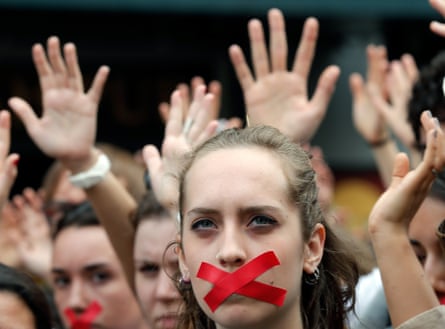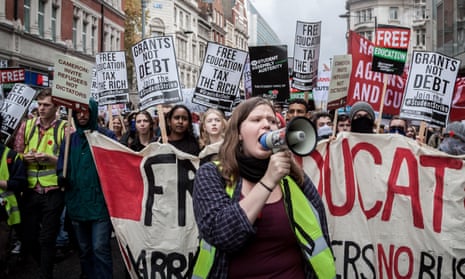“Youthquake”, defined as “a significant cultural, political, or social change arising from the actions or influence of young people”, has been selected by Oxford Dictionaries as the 2017 word of the year.
The term saw a 401% increase in usage year-on-year as 2017 saw the often-maligned millennial generation drive political change. The publishers cited the UK and New Zealand general elections as examples of young voters mobilising to support opposition parties.
Youthquake was chosen off a shortlist of 10 words that includes other timely political terms, including Antifa – a shortening of “anti-fascist” that has morphed over time to become a proper noun for a political movement – and kompromat – a word for compromising information gathered to be used in blackmail, typically for political purposes. It made headlines in September, when Russian politician Nikita Isaev threatened to “hit Donald Trump with our kompromat” on state TV.
Other words in the running this year include broflake, a label for men who are easily enraged by progressive attitudes that conflict with their views; unicorn, a description for items of food and drink that are altered to be colourful and glittery; and Milkshake Duck, a term for a person or thing that inspires a positive reaction on social media, but is revealed to have a negative past. Taking its name from an internet meme, this phenomenon has most recently been observed in the case of Keaton Jones, an American child who appeared in an emotional video about bullying, but whose parents were revealed to have posed with Confederate flags.
While the word of the year is usually added to Oxford dictionaries, youthquake is already listed; it was originally coined in the 1960s by Vogue editor Diana Vreeland to describe how British youth were changing fashion and music around the world.
Lexicographer Susie Dent said the 2017 shortlist showed that “there’s not a lot of sunshine in the standout words this year. Words like Antifa and kompromat speak to fractured times of mistrust and frustration. In youthquake we finally found some hope in the power to change things, and had a little bit of linguistic fun along the way. It feels like the right note on which to end a difficult and divisive year.”

“Youthquake may not seem like the most obvious choice for word of the year, and it’s true that it’s yet to land firmly on American soil, but strong evidence in the UK calls it out as a word on the move,” said Casper Grathwohl, president of Oxford Dictionaries.
In a blogpost explaining the decision, Grathwohl wrote: “We chose youthquake based on its evidence and linguistic interest. But most importantly for me, at a time when our language is reflecting our deepening unrest and exhausted nerves, it is a rare political word that sounds a hopeful note. Sometimes you pick a word as the word of the year because you recognise that it has arrived, but other times you pick one that is knocking at the door and you want to help usher in ... I think this past year calls for a word we can all rally behind.”
Other words of the year selected by dictionaries include “fake news”, which was crowned by Collins Dictionary, and “feminism”, which was picked by US institution Merriam-Webster based on the increased interest in the term after the global Women’s March in early 2017.
Oxford Dictionaries word of the year 2017 shortlist
Antifa noun: A political protest movement comprising autonomous groups affiliated by their militant opposition to fascism and other forms of extreme right-wing ideology
broflake noun, informal, derogatory: A man who is readily upset or offended by progressive attitudes that conflict with his more conventional or conservative views

gorpcore noun: A style of dress incorporating utilitarian clothing of a type worn for outdoor activities
kompromat noun: Compromising information collected for use in blackmailing, discrediting, or manipulating someone, typically for political purposes
Milkshake Duck noun: A person or thing that initially inspires delight on social media but is soon revealed to have a distasteful or repugnant past
newsjacking noun: The practice of taking advantage of current events or news stories in such a way as to promote or advertise one’s product or brand
unicorn adjective [attributive]: Denoting something, especially an item of food or drink, that is dyed in rainbow colours, decorated with glitter, etc.
white fragility noun: Discomfort and defensiveness on the part of a white person when confronted by information about racial inequality and injustice

Comments (…)
Sign in or create your Guardian account to join the discussion